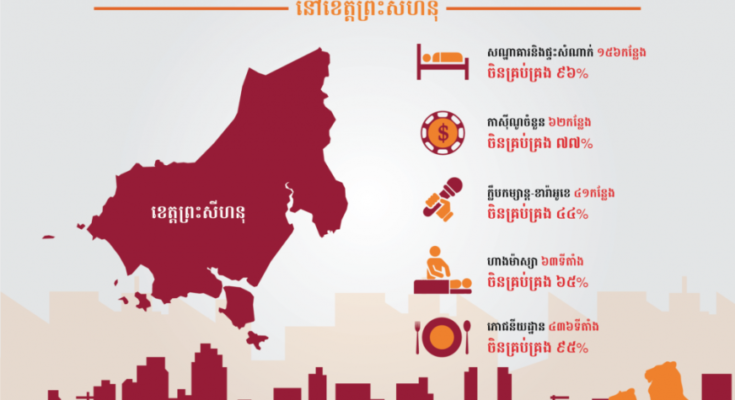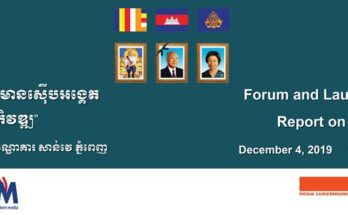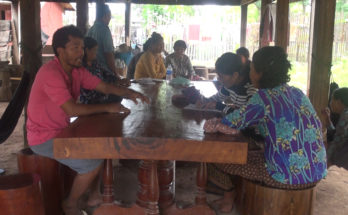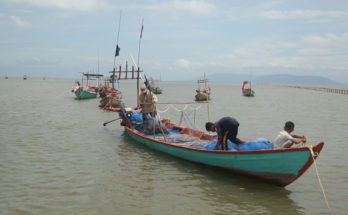Mr. Cheng Kheang is a rice vendor in Preah Sihanouk province. He said it was very hard to survive for those who earn an average of three hundred US dollars per month. From Mr. Kheang’s point of view, the price of goods in Preah Sihanouk has significantly risen.
“With the presence of the Chinese, the prices of all kinds of goods in Kompong Som, not in other provinces that I don’t know of, are very high.”
Mr. Kheang said that the Chinese living in Preah Sihanouk run food stores to serve the Chinese and the prices of food sold at Chinese restaurants are very high.
“They don’t cook food with sugar or MSG, but only salt and flour in small amounts and they run the restaurants to only serve their fellow citizens. Cambodians cannot afford the food they sell. Most of the food costs from 20 to 30 US dollars.”
It’s not only Mr. Cheng Kheang who now earns less income, but other venders also confirmed a decrease in their income.
Ms. Chorn Bork, a seller of grilled squid on O Chheu Teal Beach, said her income had decreased from 100,000 riel to 40,000 riel per day. She said she earned less income due to the lower number of national tourists and the higher prices of the suppliers’ goods.
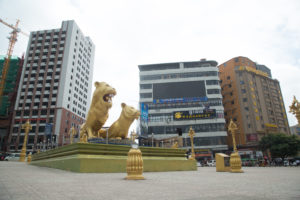
“It was fairly lucrative in the past, but it’s very low now [income]. With the higher price of squid, I still sell it at the same price. The prices of all goods have increased. The goods’ prices increase because if we get up late, the Chinese take it all over. They buy for consumption and sale in Chinese restaurants. There are no Cambodian tourists, but only construction workers. There are less tourists from Phnom Penh because the guesthouse rates have risen.”
Ms. Am, a former squid seller on O Chheu Teal Beach, reported that only 10 Cambodian stores remained in operation on O Chheu Teal Beach in Preah Sihanouk province. Some of these stores have no clients. About 90% of the stores belong to Chinese and four stores are owned by Europeans.
Even though several European stores are still in operation, some owners said they would be closed soon.
The owner of a European store, Sunset Lounge Beach Resort, who requested her identity and voice not to be revealed, said her store would be closed in December this year. She said the land she was leasing had been subleased to some Chinese. Based on the lease made between the Sunset Lounge owner and the landlord, the lease would expire in six years. She said that the landlord had leased this land to the Chinese at a higher rent. She also confirmed the decreased number of European visitors and that her clients had also dramatically decreased, so she would close the store and terminate the lease prematurely.
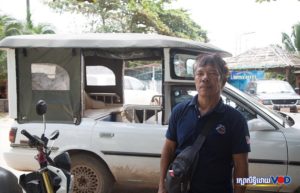
Mr. Y Vang, a driver of a store near the former Royal Residence in Preah Sihanouk province, said that two years ago, he could earn an average income of between 80,000 to 120,000 riel per day. With the presence of Chinese investors, European visitors have decreased and he can only earn an average of 40,000 riel per day.
“Our business is far harder. With the presence of a great number of European visitors, our business was very good. After the Chinese have appeared, they don’t consume our products because they have their own, so our business is so hard. Now we earn less than $10 on some days.”
Mr. Kheang Phirum, the spokesman for Preah Sihanouk provincial hall, acknowledged that there were more Chinese than other nationals doing businesses in Preah Sihanouk province.
“There are multi-nationalities in Preah Sihanouk province. There are various nationalities of foreign investors but the Chinese account for the vast majority.”
Based on the report of the foreigner census issued by the Preah Sihanouk Provincial Administration in February 2019, there are 40,770 foreigners of 57 nationalities who are permanently residing in Preah Sihanouk province.
Mr. Kong Sopheaktra, Director of the Statistics Department of the Ministry of Tourism, said that for the first seven months of 2019, Chinese tourists ranked first, followed by the French. Based on this report, the number of Chinese tourists increased by 200,000 or 101.8 percent out of the total of 480,000 foreign tourists.
Based on a report by the Ministry of Tourism, European tourists in Preah Sihanouk province have been decreasing since early January 2019. Based on the same report, just over 60,000 European and American tourists visited in the first seven months of 2019.
Miss Von Sreynet, a seller on O Chheu Teal Beach, said that two years ago her family could earn a daily income of about $US250 from the sale of seafood on the beach, but for the last two years her income has decreased, and she has earned less than $US100 on some occasions. She said the decrease in income was due to the decreased number of tourists in Kompong Som. On the other hand, the Chinese had started to run their stores on the beach as the Cambodians did.
“In the past, I earned approximately 200-300 US dollars. It was a bit more or less from day to day, but now we earn far less due to the continuous rain and the decreased number of visitors.”
Mr. Ry Rouen, a tour driver at Kompong Som Airport, said most Cambodian people had given up their occupations and left for other provinces. The main reason for landlords to lease their land to Chinese is because they get a higher rate. Another reason is the decreased number of national and European tourists, so they earn less income. He said all these reasons had forced businesspeople to leave Kompong Som.
“There are various reasons. One of them is that less provincial and Phnom Penh people come to visit here due to the shortage of guesthouses. Now there are less Cambodian people staying at guesthouses, and there are only Chinese. Normally Cambodians and Chinese are different. Chinese speak loudly and do not have good order while European people are friendly.”
Mr. Sorn Siphal is the Director of the Preah Sihanouk provincial tax branch. He is in charge of collecting data on the registration of land and houses. He confirmed that he was not aware of the number of Cambodian people leasing land to Chinese.
After interviewing about 30 people on different occasions in Preah Sihanouk, 60% of them felt they had been negatively affected by the development in the province. Based on their estimation, approximately 40% of the people felt they had significantly benefitted from the development.
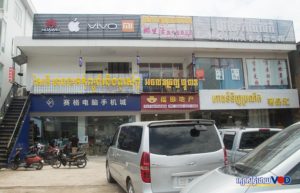
Based on data of the Preah Sihanouk Provincial Administration from August 29, 2019, there are 52 companies investing in the province. Based on the same report, about 90% of them are from China.
Based on a Chinese investment report received by VOD from the Planning Office of the Preah Sihanouk Provincial Administration, by April 2019 the investment accounted for over 8 billion, 460 million US dollars ($8,460,418,364). A total of 52 projects are consuming this investment in several sectors, such as tourism services, property, special economic zones, infrastructure, and industry.
Carl Khouri Klink, a student at a University of Singapore, conducted research on the impact of Chinese investment in Preah Sihanouk province. His report revealed that from 1994 to 2013, China spent approximately 10 billion dollars in investment in Cambodia.
Based on the report, those investments focused on agriculture, infrastructure, hydropower dams, and garment factories. The report, which was concluded in August 2019, also revealed that from 2013 to 2017, China invested approximately 5.3 billion US dollars in Cambodia, representing a fivefold increase compared to 1994 – 2013. The report also revealed that 1.1 billion US dollars was invested in projects in Preah Sihanouk in 2017 alone.
Mrs. Chieb Sotheary, Preah Sihanouk provincial Adhoc coordinator, said that the local people receive very few benefits from the Chinese investment in the province. She said that most of the benefits have gone to Chinese citizens. She noted that wealthy Cambodian people who have buildings and lands lease their property to Chinese, then leave the provinces to live in other places.
“In large restaurant businesses, there are more Chinese than Cambodians, so they only use their fellow nationals’ products. They only use Cambodian products which are not supplied by their Chinese fellows. So, the question is who buys Cambodian products when most Cambodians have left and some of them have closed their businesses?”
In the first semi-annual wrap-up report of 2019, Mr. Yon Min stated that due to rapid growth in all sectors, the Preah Sihanouk provincial poverty rate had decreased to 10.72% per year. He said people in Preah Sihanouk received an average income of 3,358 US dollars per year.
Mr. Hun Samnang, a former director of the tourist cyclo association, who currently serves as the chief of Rith Mony city bus service, said that permitting the Chinese to penetrate small markets, from vegetable sales to taxi services, is a threat to local Cambodian people’s livelihoods. He said that with continuous competition by the Chinese without the government’s intervention, the local economy will be finished.
“Yes, some Chinese drive tuk-tuks and taxis, so if this situation continues, how can we survive?”
Based on data from Mr. Vorn Pov, IDIEA director, there are 3500 tuk-tuk and taxi drivers in Preah Sihanouk. He explained that before the recent law enforcement by the authorities, there were about 40% of tuk-tuk and tricycle drivers were Chinese, but after the law enforcement this number had decreased by 20%. However, they (Chinese) still secretly serve customers through online portals and WeChat.
While small businesses are negatively affected by Chinese businesspeople, some construction materials sellers confirmed an increase in their income.
A construction business owner, Siev Kuong, reported that since the Chinese had appeared, he had earned significant income from his construction business. However, he refused to reveal the specific amount of his income generated from the construction sector. He said that about 80% of Chinese people were also doing construction business as the Cambodians do, but this number had decreased after the government took action against Chinese online crime.
“After they reportedly left, the situation seems better. Online businesspeople are extravagant, so they lease a lot of buildings and spend a lot money in their business. So, after they have left, the situation seems better. The number of Chinese people has dropped about 50%. This is a significant decrease”.
In Preah Sihanouk province, the typical Chinese-run businesses are foreign exchanges, hair salons, welding shops, taxis, Indian tricycle drivers, massage parlors, sales of groceries, fish, and pork just as the local Cambodian people do.
Mr. Chuon Narin, Preah Sihanouk provincial commissioner, said in July 2019 that almost 90% of the businesses in Preah Sihanouk province are run by Chinese. Those business include guesthouses, hotels, massage parlors, restaurants, and casinos.
Mr. Chuon Narin stated that 150 of 156 guesthouses and hotels are run by Chinese, 48 of 62 casinos are owned by Chinese, 18 of 41 entertainment/KTV clubs are owned by Chinese, 46 of 63 massage parlors are owned by Chinese and 95% of 436 restaurants are owned by Chinese.
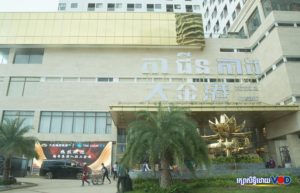
The Ministry of Labor and Vocational Training issued a decision on August 28, 2019 to define the occupations and employments prohibited for foreigners. Through this decision, the government prohibits 10 types of business from being run by foreigners residing in Cambodia.
Those occupations include: 1) drivers of any type of vehicle as a business, such as two- and three-wheeled vehicles, cars and trucks. Non-Cambodians are also not allowed to be vendors selling goods in public locations either on foot or using any types of vehicle; providing massages in public locations; or work as barbers, hairdressers and beauticians. Foreigners cannot provide sewing services or shine shoes; be a tailor or dressmaker; a tire repairer or mechanic; a producer of Khmer souvenirs; or a producer of Khmer musical instruments, monk’s alms bowls or Buddhist statues; or work as goldsmiths or processors of precious stones.
The Ministry of Labor has threatened to not extend the validity of work cards/permits if foreigners are found to be running any of the prohibited businesses.
The Ministry of Labor’s spokesman, Mr. Heng Suor, stated that foreigners who violate this prohibition will be deported from Cambodia based on the Law on Immigration.
Mr. Cheng Kheang, a rice seller in Preah Sihanouk province, wished to see effective measures taken on the Ministry of Labor’s decision.
“I also saw the announcement on Facebook. The government will prohibit small businesses [from being run by foreigners], but I observed that no measures had been taken in Kompong Som. It seems they only beat the drum to make sound.”
Ms. Keng Chhenglang, Vice President of the national labor union federation of the Cambodian textile industry, wants the Ministry’s measures to cover other occupations more extensively.
“We have already talked a lot and the Ministry said these occupations are for the first trial. This is the first time that they responded to what we were discussing. The law only prohibits personal businesses, but the registered companies can do it.”
Mr. Vorn Pov, Director of the Independent Democracy of Informal Economy Association (IDIEA), insisted that the Ministry should include foreigners who are doing construction work into the foreigner prohibition regulations. He also urged the Ministry to take effective measures.
“It seems that it will not bring about any benefits because there are a few massagers on the beach; what is important are all of the provincial massage parlors, which should be covered by the Ministry of Labor’s announcement more seriously.”
Mr. Heng Suor said that in fact the Ministry of Labor’s announcement is only binding upon the self-employed or informal economy, while foreigners working at enterprises and institutions shall be under the Law on Labor.
Mr. Sreng Vanly, Preah Sihanouk provincial Licadho coordinator, insisted that the government should control occupations and check the local people’s needs to ensure the best interests of Cambodian people.
“If no serious action is taken, in the future more Cambodian people will lease and continue to close their businesses in Preah Sihanouk province. First, Cambodian people cannot afford the property; second, now more people have left. Some of them lease their property while some other cannot afford to lease.”
The Ministry of Labor’s spokesman, Mr. Heng Suor, said that the Ministry will check self-employment or informal economy employments. He said if this has truly happened, the Ministry’s prakas shall apply.
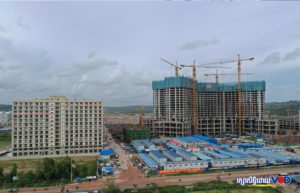
Mr. Nget Chou, a finance and investment specialist, believes that the rapid economic growth in Preah Sihanouk province will not be sustainable in the long run. He said such economic momentum will decline in three or five years when construction activities drop.
“We should be aware that casino construction will not continue endlessly. When the goal is reached or the construction ends, the contribution to the casino sector will replace it. Our people and their children can work in the casino sector. So, they need other experiences and skills.”
Nevertheless, in an interview with reporters Mr. Kheang Phirum, spokesman for Preah Sihanouk provincial hall, said that the number of foreigners who had been involved in these businesses has been significantly reduced.
He said the authorities will disseminate the laws more widely to foreigners to ensure that this problem [foreigners operating prohibited businesses] will no longer exist.
(This report is written by Mam Moniroth contracted under the project of CCIM supported by Rosa Luxemburg Stiftung)

